The Last Witchking Read online
Page 2
He followed the edge of the forest around the wheat field to where he could see the entire cottage. His heart sank and tears filled his eyes when he confirmed that it wasn’t only the roof that was burning ferociously. The villagers weren’t even trying to douse the flames any longer, now they were soaking the neighboring houses instead to reduce the chance that the fire would spread. He saw the butcher’s daughter standing with her fist in her mouth. From the way that her mother went to embrace her, he could tell that she was crying.
My mother is dead, he told himself. It didn’t make sense, not when he’d been sitting at the table with them less than a bell ago. My father is dead. Only he is not my father.
I am dead. He looked at his hands, then back at the pretty, brown-haired girl. But I am still here, so who is dead? Surely someone will notice something is amiss if there are only two bodies!
Then he recalled an outrage that took place in Pretigny about six months ago. A grave was violated in the cemetery behind the church, the grave of an older boy from the village who died of a locked jaw when Speer was six. There had been much talk at the time of sorcerers and black wizards, of witches and necromancers, but nothing had ever come of it. The body was never found. Speer suddenly had a terrible feeling that, in the morning, his neighbors would find the burned remains of the three bodies they were expecting to be inside the cottage.
They planned this, he thought. Before I was ever born, they planned this. The desire to run out to his neighbors and tell them that he was well, that he had survived the blaze, was almost overwhelming. But then he looked at Liesl, the butcher’s daughter. She was crying, her face was red and streaked with tears. She would not shed tears for a witchking. No one would. If they knew, if they even suspected that his blood was of that great and terrible breed, the mere mention of whom was enough to cause even the stoutest man’s heart to quail, they would cast him bodily into the flames.
I am a witchking! How could that be? It didn’t seem possible. The witchkings were creatures of terror, of legend, they were powerful, and evil, and cruel. How could he be a witchking when he was only a boy? He pulled the note out of his coat. I am the son of…Mauragh. Thauragh was my grandfather.
My name is Dauragh.
Could it be true? He knew his father, or rather, the man he had believed until today to be his father, and he knew Per Gnasor was a good man. Had been a good man. More than that, he had been a good father. And yet, he died—he killed himself—rather than risk betraying the secret of Speer’s birth. Speer also knew, he was certain beyond any doubt, that his mother had loved him as much as any mother in the village loved her children. More than most, perhaps, as he was an only child instead of one in a pack of five or six. And she too had chosen death rather than risk betraying him. Who he was, what he was, was so important to her that she had given her life for it.
A phoenix raised by sparrows…could it be true?
Tears flowed down his cheeks as he thought of the love and kindness his mother and father, his adoptive mother and father, had always shown him. A sob threatened to rip itself from his throat, but he clenched his teeth and mastered it. It must be true. They would not have died for nothing. He reached a decision: No matter what, he would be worthy of them, he vowed silently to himself. He would not permit their terrible sacrifice to have been made in vain.
As the sun continued its descent, he turned his back on the village of Pretigny, on his burning home, and walked wearily toward the hole in the forest. There he retrieved the chest and opened it again. He marveled at the number of gold coins, which struck him as an absolute fortune, and reviewed the directions while there was enough light left in the day to read them by.
The Wolf Isles? He had heard tales of the fierce barbarians who waged bitter and pointless wars among themselves across the sea, but he’d never thought he would actually ever lay eyes upon them. Now he was to make his home among them? But first, he reminded himself, he had a long and perilous march of many days before him. And a voyage across the White Sea!
He smiled bitterly. All the world was against him, a boy barely thirteen who was still secretly afraid of the dark. A boy who had only just learned his name.
Speer—Dauragh, son of Mauragh—wiped his eyes with his sleeve and began to walk toward the sea.
At Gonne, he found a fisherman with a boat for hire. The boat carried him across the White Sea and to the little port town of Thjovrer, on the eastern side of the largest island.
Although Speer had heard many stories about the dread Witchkings and their awful power, he did not even begin to imagine the extent to which they were feared, even by the northern reavers. That changed when, still following the directions that Per Gnasor had left for him, he sought a guide to lead him from Thjovrer to something that was marked on the map with an X and labeled Mordlis.
The name struck him as a grim one, but it was no worse than the name of many a Dalarn town, which appeared to be as likely to be named after a bloody battle that took place nearby, or in one case, a notorious murder, as for their scenic attributes. But when he followed his instructions and displayed his true father’s ring to a pair of burly blond reavers who had been eyeing him as if he were fresh meat, they fell to their bellies and inexplicably began groveling before him. Their reaction frightened him a little, but he accepted their offer of a horse as well as companionship on the road to Mordlis. As they traveled, it soon became clear that they expected to be well-rewarded for assisting him.
Mordlis stood on the shores of the White Sea a long day’s ride north of Thjovrer. By the time the peak of its dark tower appeared on the horizon, the last village they’d passed along the old dirt road that led to it was more than a bell’s ride away. The road was little traveled too, that much was clear from the long grass that grew over most of the roadway and was turning brown with the dying autumn.
The three of them were intercepted by a squad of six huge, black-clad guards in the shadow of the small, but foreboding castle. Their only greeting was a metal-gauntleted hand raised in silent warning. The armored men stared at him, their hands on their weapons, and waited. For what? The two Dalarn attempted to explain, but the guards ignored them. Speer stared at six silent men, knowing that to speak wrongly might mean his death, until he reached into his pouch and withdrew his father’s ring.
No sooner had he held it up and shown it to the guardsmen than four of them drew their swords and slew both of his companions before they could defend themselves. Speer was too shocked and horrified to be scared. He stared at the silent men and their dripping blades, but they made no move to attack him. Nor did they deign to speak.
Who am I, he wondered, that death follows me everywhere I go? What sort of monster am I? And if I am not one already, what sort of monster will I become?
Whatever sort of monster vengeance requires you to be. He heard the voice in his mind as if it were the shade of his true father. He knew so little of the man, but Mauragh’s icy determination and unblinkingly ruthless nature was already more than apparent to him. And yet, neither his father’s dark powers nor his iron will had been enough to save him or Speer’s true mother.
The guards did not speak, they only cleaned their weapons before one of them pointed at him, then toward the castle. He rode slowly toward it, with three of them on either side. A bell rang out from the tower. At first, he thought it was announcing the time, but when it did not stop he realized it was in honor, or perhaps warning, of his imminent arrival.
The great wooden gates of the castle opened, and a man strode out. He was short, barely taller than Speer, and he was ugly, but he carried himself with an arrogance that did not seem entirely misplaced. The little man wore a dark brown cloak that nearly brushed the ground, and he swept one side of it back with his left hand as he bowed so deeply that Speer wondered he did not fall over.
“Lord Dauragh, I rejoice to meet you at last! We have been waiting for you here for thirteen years. I am Cajarc, and I will be your teacher.”
Ca
jarc, as Speer rapidly came to learn, was an excellent instructor. He was a sorcerer, an Écarlatean, and according to him, one of Mauragh’s closest confidants. He was older than he looked too. Speer had initially thought Cajarc was in his late thirties, but based on the way in which the man recounted some of the events during Speer’s history lessons, he must have been at least eighty. Cajarc oversaw every aspect of Speer’s education, from personally tutoring him in history, mathematics, and philosophy to watching Speer cross swords, daggers, and staffs with the silent guards.
Cajarc also told him the reason for the silence of the men of Mordlis. Before sending them across the White Sea to await Speer's coming, his father had removed their tongues.
It was a strange life and a lonely one, but it was seldom dull despite the fact that the stone chambers of the castle were nearly silent as the household staff went about their business. Of the eighteen guards and servants who lived in the castle, only Cajarc, one of the kitchen drabs, and one elderly gardener still possessed their tongues. The others communicated in signs. They did not seem to resent Speer for their loss, however, and they seemed to walk in awe of him for no reason that Speer could understand.
The castle library was immense, with two fireplaces, dozens of hidebound books, and scores of tightly rolled vellum scrolls. A few of the older codices were stacked on the three highest shelves and forbidden to him, but Cajarc otherwise encouraged him to indulge himself by reading as much as he liked. Which, as it happened, was a considerable amount. He learned of the Three Realms of Chênevin, Écarlate, and Savonne, of the Seven Kingdoms over which the Seven Witchkings had ruled, of the great cities to the south, the ancient, inhuman elves to the east, and the barbarian horse tribes that roamed the western steppes.
The winter, when it came, was even harsher than Speer had expected, but at least one fire was always roaring in the library. It was there, with only codices and one or two of the castle’s cats for companions, that he spent the greater part of his days.
He was permitted the run of the castle, excepting only Cajarc’s chambers, which abutted his own pair of rooms on the first level, and whatever lay beneath the circular stone stairs that led down below the ground level. The dungeons were there, or so he was told, although no one seemed to be inhabiting them as far as he could tell. He was forbidden to go there, not only on pains of the most severe punishment, but by his true mother’s name. Having no wish to learn what Cajarc considered severe, he abided by the restrictions imposed upon him.
The winter snows had just begun to melt when, one evening, over a dinner that consisted of a fishy seafowl killed by one of the guards, day-old bread, and a hard cheese made from goat’s milk that made him long for the softer, more flavorful cheeses to which he had been accustomed in Pretigny, Cajarc informed him that he was to begin lessons with his second teacher that very evening. Cajarc seemed amused, which piqued Speer’s curiosity. What sort of arts required the darkness of night? Was he about to be initiated into the Greater Truths of the Wahrkunst? He was puzzled when, after having been promised this new teacher, he was sent to bed after being permitted only a single bell of post-dinner reading in the library.
The woman who came to his chambers that night was considerably older than him. But she was kind, she was soft, she was pretty, and she was experienced. She introduced him to a magical world of pleasures he had never even suspected might exist. She was patient too, answering his every question with a grave and serious face, never betraying even a hint of amusement.
For the next two weeks, she came to him every night. Every morning, Speer awoke, naked and sated, alone in his bed. At the end of the fortnight, she vanished. He never saw her again, and neither she nor Cajarc ever told him her name, but there were nights when he closed his eyes and vividly pictured her large, heavy breasts, her wide-set eyes, her oval face, and her thick, womanly hips.
But not often. Between his lessons and his training in weapons with the guardsmen, there were many nights when Speer nodded off over a manuscript in the library and was half-carried, half-dragged to his chambers by Cajarc and one or two of the castle’s servitors.
Manhood brought about two changes in Speer’s routine. The first was that Cajarc spent less time tutoring him on history and philosophy and began teaching daily lessons in magic. They would begin with vauderie, the little man informed him, the discipline utilized by the Savondese Royal Academy, as it would give him a firm grounding in the esoteric arts he would need to master.
“Anyone with sufficient talent can call up fire or scry a pool of water,” the Écarlatean explained. “But mastery concerns more than action. Mastery relies upon knowing precisely what you are doing and why you are able to do it. To marry action with understanding, that is the object.”
“Was my father a master of magic?” Speer wanted to know.
“Of magics,” Cajarc said. “Vauderie is, well, I will not say that it is trivial, but it is limited. One might even say it borders on the common. Your father’s art, your people’s art, extended well beyond those limits.”
He smiled faintly, staring off into the distance as if he was seeing with the eyes of memory. Speer wondered what he saw.
“That is why your race was feared, Lord Dauragh. That is why, when you have received your full inheritance, you too will be feared.”
Speer learned of the second change in his routine about ten days after he began his lessons in vauderie. Earlier that day, he had succeeded in casting his first spell, a simple one that involved nothing more than snuffing out a candle then lighting it again. It was actually easier to do than to understand. He still wasn’t entirely sure why it worked, but when he concentrated and put his mind in the proper state, he could actually see the paths of force, the strings of magic, that flowed over, around, and through him like the wind.
Lighting the candle was nothing more than intensifying the connection on the flow that ran between him and the candlewick. When he focused his mind upon it, he could see the thin, faint pink string deepen and expand into a ruby-colored tunnel. Once the connection was strengthened, all that was necessary was to call the element of fire by its true name, the one he had been taught by Cajarc, and it appeared instantly, springing to life fully formed and burning like any other candle flame.
“Will, talent, and knowledge,” Cajarc told him. “That’s all vauderie is, the combination of those three things. Without talent, you cannot see or feel the forces that bind everything together, all throughout Creation. Without knowledge, you will not know how to use that which you see and feel. And without will, you can accomplish nothing, no matter what your eyes may see or what your mind knows to be true.”
“It’s like air and tinder, waiting for the spark.”
“Precisely.” Cajarc ruffled his hair and snuffed out the flame with his fingers. “Without the spark, there is no fire. You’ve done well, my lord. Just don’t set the curtains alight experimenting with your new abilities.”
Speer was thrilled. He was a magician! He was a sorcerer! No, he corrected himself, he was a Witchking! Whatever doubts he had harbored about the fantastic and terrible secret of his dread lineage vanished as quickly as the flame between Cajarc’s fingers.
“But there is more,” he told Cajarc. “You said this is the Academy’s art. Not my father’s.”
“Yes, Lord Dauragh, there is more. There is most certainly more. But never forget: No matter what the discipline, no matter how dark the art, without the spark, there can be no fire.”
Perhaps as a reward, perhaps as a distraction intended to prevent him from burning down the castle in the night, Cajarc sent him another woman. This time she was considerably younger, a Dalarn girl not much older than Speer himself, with long blond hair and breasts that were not even a handful. She was a maiden and very nearly as nervous as he was himself. It was awkward, it was uncomfortable, and yet, there was something more meaningful about her presence in his chambers than had been the case with her older predecessor, the woman Speer still thought of
as Her.
There was something about the girl’s nervousness, her fear, that awoke a sleeping shadow within him. He was not cruel to her, but neither was he kind. And when she cried out in pain rather than in pleasure, he learned to his surprise that he liked it very much indeed.
Months passed, then years. His sensitivity to the great web of power, as he thought of it, now rivaled Cajarc’s. His vauderic knowledge was both deep and wide. Cajarc assured him that he would be more than a match for any Academy mage in battle, though not a grandmaster or immortel. If his will was not yet what it would be, it was nevertheless more than enough to transform even the most fragile and tenuous thread into a thick cable of force that would bear even the most weighty magics.
But despite his training, he was no master swordsman. He was competent, nothing more, and more comfortable on the defensive than the attack. He preferred to wait for his opponent to commit himself, then strike back with a counter designed to exploit the openings created. Most of the guardsmen were able to best him without much trouble—until the day he discovered that he could use his vauderie to manipulate their weapons, pulling a blade forward as a man lunged or causing it to dip just as he was attacking. Overnight, he became formidable, very nearly unbeatable, and although the guards must have suspected what he was doing, he never did more than was absolutely necessary.
Cajarc, however, was well aware of his new trick. The day after Speer discovered he could combine the art of the sword with the vauderic art, his tutor showed up for the afternoon sparring, something he had not done in years. He watched with an amused half-smile on his face as Speer defeated one guard after another.

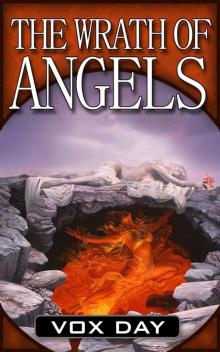 The Wrath of Angels (Eternal Warriors Book 3)
The Wrath of Angels (Eternal Warriors Book 3) SJWs Always Lie
SJWs Always Lie The War in Heaven (Eternal Warriors Book 1)
The War in Heaven (Eternal Warriors Book 1) SJWs Always Double Down: Anticipating the Thought Police (The Laws of Social Justice Book 2)
SJWs Always Double Down: Anticipating the Thought Police (The Laws of Social Justice Book 2)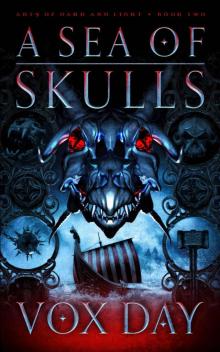 A Sea of Skulls (Arts of Dark and Light Book 2)
A Sea of Skulls (Arts of Dark and Light Book 2)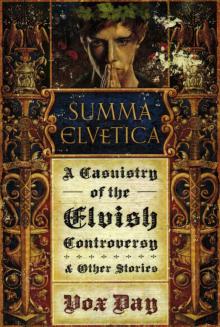 Summa Elvetica: A Casuistry of the Elvish Controversy and Other Stories
Summa Elvetica: A Casuistry of the Elvish Controversy and Other Stories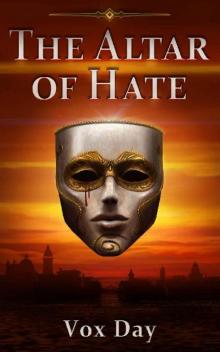 The Altar of Hate
The Altar of Hate A Mind Programmed
A Mind Programmed The World in Shadow (Eternal Warriors Book 2)
The World in Shadow (Eternal Warriors Book 2)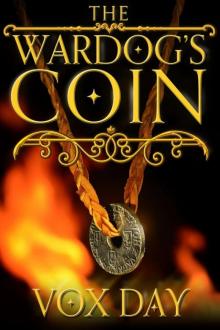 The Wardog's Coin
The Wardog's Coin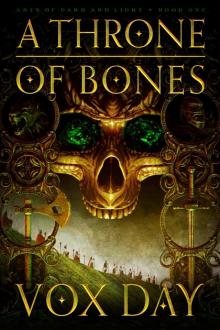 Arts of Dark and Light: Book 01 - A Throne of Bones
Arts of Dark and Light: Book 01 - A Throne of Bones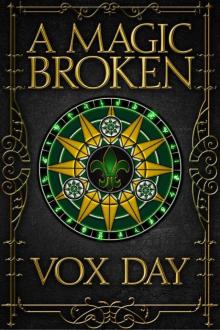 A Magic Broken
A Magic Broken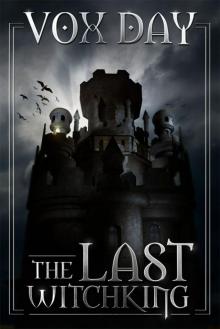 The Last Witchking
The Last Witchking